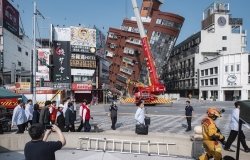Active Society in Formation: Environmentalism, Labor and the Underworld in China
Ching Kwan Lee, University of Michigan; Ming Xia, College of Staten Island, CUNY; Guobin Yang, University of Hawaii, Manoa; Commentator: Elizabeth J. Perry, Harvard University
Overview
What has been the effect on Chinese society of two decades of economic reform? What new issues face China's leadership? Three Woodrow Wilson Center fellows, Guobin Yang, Ching Kwan Lee and Ming Xia, presented their research papers on China's environmental, labor, and organized crime issues, respectively, at a May 18 seminar co-hosted by the Asia Program and the China Environment Forum. Elizabeth Perry of Harvard University offered comments on the three papers at the end of the seminar.
Guobin Yang argued that the environmental movement in China aims to influence consumer behavior, business practices, and government policies, without directly challenging state power. This movement differs significantly from previous social movements, due to its growing organizational base, close ties with the media and international organizations, and the use of new repertoires of collective action. Ching Kwan Lee explored the two most restive segments of the Chinese labor force: migrant workers in global factories, and unemployed and retired workers of state industries. According to Lee, Chinese labor politics cannot be fully captured by the conventional rubrics of "class struggle" or the politics of "citizenship." Rather, Chinese workers make claims as the disenfranchised "masses" or "weak and deprived groups." Ming Xia attributed the resurgence of organized crime in China since the early 1980s to the following factors: the failure of the state in addressing the structural causes of crime; the lack of societal groups serving as "watchdogs" of the state; and government's suppression of civil society and democratic forces. Xia predicted that "black gold politics"(the involvement of local officials in illegal business activities) would accelerate unless China democratizes.
Commentator Elizabeth Perry emphasized the impact of China's old political campaigns on current social movements in terms of state-society cooperation. She also discussed organized crime in pre-1980 China, and the multiple identities of Chinese workers as members of the working class, ordinary citizens and "disenfranchised masses." This seminar highlights both positive and negative aspects of Chinese society in the reform ear.
Hosted By

Indo-Pacific Program
The Indo-Pacific Program promotes policy debate and intellectual discussions on US interests in the Asia-Pacific as well as political, economic, security, and social issues relating to the world’s most populous and economically dynamic region. Read more

China Environment Forum
Since 1997, the China Environment Forum's mission has been to forge US-China cooperation on energy, environment, and sustainable development challenges. We play a unique nonpartisan role in creating multi-stakeholder dialogues around these issues. Read more
Thank you for your interest in this event. Please send any feedback or questions to our Events staff.










